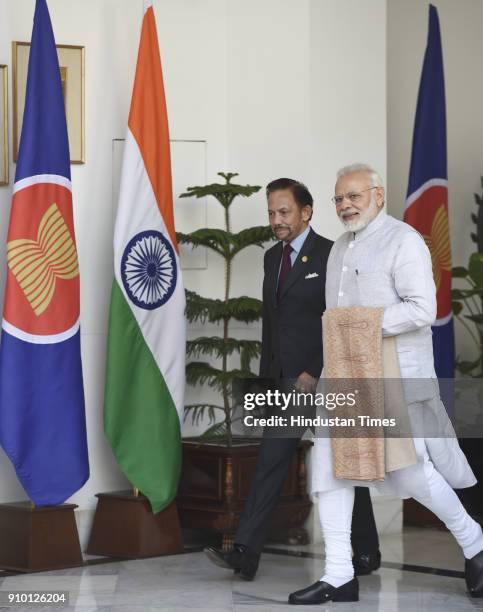


As part of his tour in Southeast Asia, Indian Prime Minister Narendra Modi is set to meet the Sultan of Brunei, Hassanal Bolkiah, to discuss cooperation in various areas such as defence, trade, and technology. This will be their third meeting, with their first two having taken place in 2014 and 2017. The visit, which coincides with the 40th anniversary of diplomatic ties between India and Brunei, is expected to further strengthen the historical relationship between the two countries.
India and Brunei Deepen Ties as Prime Minister Modi Visits
Background
India and Brunei have enjoyed a close relationship for decades, with formal diplomatic ties established in 1984. Both countries share a common commitment to peace, stability, and economic development in the Southeast Asian region.
In recent years, bilateral cooperation has expanded significantly across various sectors, including:
Modi's Meeting with Sultan of Brunei
Indian Prime Minister Narendra Modi is currently visiting Southeast Asia, where he is scheduled to meet with the Sultan of Brunei, Hassanal Bolkiah. This will be their third meeting, following previous encounters in 2014 and 2017.
The meeting is expected to focus on further strengthening cooperation in areas such as:
The visit also coincides with the 40th anniversary of diplomatic ties between India and Brunei, providing an opportunity to celebrate the historical friendship and explore avenues for future cooperation.
Top 5 FAQs
1. What is the significance of Prime Minister Modi's visit to Brunei? Modi's visit is a testament to the strong and growing ties between India and Brunei. It aims to enhance cooperation in key areas and deepen the historical relationship between the two countries.
2. How has cooperation between India and Brunei benefited both countries? Bilateral cooperation has led to increased trade, improved energy security, enhanced defense capabilities, and expanded educational opportunities. It has also contributed to regional stability and prosperity.
3. What are the challenges faced by India and Brunei in their relationship? Despite their close ties, India and Brunei face challenges such as geographical distance, economic differences, and limited market access. However, both countries are committed to finding solutions and overcoming these obstacles.
4. How has the COVID-19 pandemic affected the relationship between India and Brunei? The pandemic has temporarily disrupted economic activity and travel between the two countries. However, both governments have taken steps to mitigate the impact and maintain close cooperation.
5. What is the future outlook for India-Brunei relations? The relationship between India and Brunei is expected to continue strengthening in the coming years. Both countries have expressed a desire to expand cooperation in new areas, such as digital technology, sustainable development, and healthcare.

A stampede at the Kasibugga Venkateswara Swamy Temple in Andhra Pradesh has left 10 dead and two injured. The temple had recently reopened and was experiencing high footfall due to a festival. Home Minister Vangalapudi Anitha has ordered a thorough investigation into the causes of the tragedy and has promised strict measures to prevent similar incidents in the future.

India and the United States have strengthened their already strong ties by signing a 10-year framework for their major defense partnership. The agreement, signed during a bilateral meeting between the two countries' defense ministers, emphasizes the importance of this partnership in maintaining a free and open Indo-Pacific region. This marks a significant step in solidifying the bond between India and the US in the defense sector.

In preparation for a major tri-service military drill, India has issued Notices to Airmen (NOTAM) for the entire northeastern region that borders China, Bhutan, Myanmar, and Bangladesh. The first set of exercises will commence in November and continue through January, signaling enhanced operational readiness for the Indian Air Force (IAF). This move is significant as the Northeast remains a sensitive theater, making up the boundary with four countries, including China. The upcoming IAF exercises aim to strengthen India's air dominance, effectively preparing for any potential challenges along the western frontier with Pakistan.

India will conduct a 10-day military exercise in Rajasthan and Gujarat involving the Army, Air Force, and Navy to showcase its operational readiness following Operation Sindoor earlier this year. The exercise, announced through a NOTAM, features advanced military technologies and emphasises the integration of speed, firepower, and precision in desert warfare conditions. It comes amidst heightened tensions with Pakistan and a renewed focus on maintaining military readiness along the border.

Jammu and Kashmir police have filed an FIR against a group of Christian missionaries in Kathua district for allegedly attempting religious conversions through financial incentives. This comes after a video surfaced online showing the missionaries being attacked and their vehicle vandalized by villagers. The incident has sparked outrage and protests from local Hindu groups, demanding action against the accused missionaries. One accused, Ravindra Singh Thela, has been arrested while the main accused, Vivek Soni, is still at large. The police have also suspended eight personnel for failing to stop the attack.

US Vice President JD Vance, who converted to Catholicism in 2019, has revealed that he hopes his Hindu-raised wife, Usha Vance, will eventually embrace Christianity. However, he clarifies that their interfaith marriage is built on mutual respect and understanding, and that Usha has complete freedom of choice in matters of faith. The couple has found a balanced way to manage their interfaith household, with their children attending a Christian school and given the choice to be baptized.

US President Donald Trump has expressed optimism about reaching a trade deal with China "pretty soon" after a meeting with Chinese President Xi Jinping in South Korea. In addition to announcing lower tariffs on Chinese imports, Trump also stated that the issue over US access to rare earths has been resolved. However, there has been no official response from Beijing and the final decision on the sale of Chinese-owned TikTok's US operations is still pending. Analysts see these developments as a breakthrough in the ongoing trade tensions between the two countries. Our correspondents provide insight on the discussions between the two leaders and speculate on why Xi may have felt confident walking into the meeting.

At the Asia-Pacific Economic Cooperation (APEC) Summit in South Korea, Chinese President Xi Jinping and US President Donald Trump met for their first in-person talks in several years. Despite past frictions, Xi called for closer cooperation between the two largest economies in the world, emphasizing the importance of being "partners and friends." Acknowledging Trump's peace efforts in the Middle East, Xi commended his contributions and praised him as a "tough negotiator." Trump also expressed optimism for a productive discussion on trade and global security.

In a historic event, Prime Minister Shri Narendra Modi addressed the Global Maritime Leaders Conclave and chaired the Global Maritime CEO Forum at India Maritime Week 2025 in Mumbai, welcoming participants from over 85 countries. With major shipping giants, startups, policymakers, and innovators in attendance, the summit showcased India's advancements in the maritime sector, such as the replacement of outdated colonial laws with modern ones and the recognition of large ships as infrastructure assets. Amidst global tensions, India stands as a symbol of strategic autonomy and inclusive growth, ready to take on a leading role in the world's rough seas.

Indian Prime Minister Narendra Modi has declared that the next generation of Goods and Services Tax (GST) reforms will begin on the first day of the Navratri festival. This major economic overhaul aims to streamline the current GST system and support businesses, especially small and medium enterprises. In other news, the National Human Rights Commission (NHRC) and Ministry of External Affairs (MEA) are collaborating to organize a six-day program in New Delhi to strengthen executive capacity for International Technical and Economic Cooperation (ITEC). Lastly, the upcoming BIRC 2025 conference will take place at the Bharat Mandapam in New Delhi.